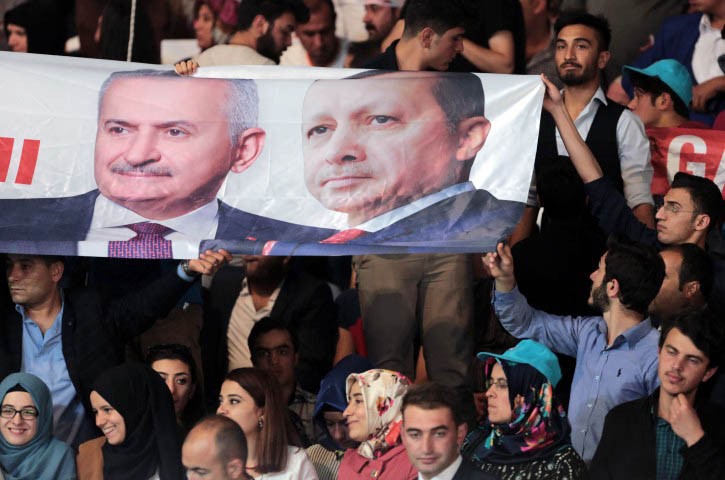
President Tayyip Erdogan’s political ambitions are adding elements of uncertainty in Turkey’s polity

Since the Turkish general election in 2016, when the Justice and Development Party (AKP) consolidated its hold on power on the back of a strong security state agenda, Turkey could be a new territory a few months down the road.
How things looked promising and outward a few months ago?
In March, Turkey entered into a far-reaching migration-containment deal with the EU -- to stem the flow of migrants into the EU. The architect of the deal, Prime Minister Ahmet Davutoglu, was at the height of his international reputation as an acceptable fact of Turkey. This deal also cemented for Tayyip Erdogan not only an eminent position in Turkey but also in Europe.
In return for policing European borders, Turkey obtained its long-held goal of getting the right of Turkish citizen for visa-free travel in Europe, along with the promise of reopening and expediting Turkish membership of the EU.
These achievements added another feather to Erdogan’s cap.
Some western critics of Erdogan accused the EU of placing the future of the EU-migration policy in the unreliable hand of Erdogan.
However, the good mood was short-lived. In the first week of May, the Turkish-EU deal maker, Davutoglu, resigned from his position to pave way for his successor. The resignation signified that, despite Davutoglu’s conciliatory nature of politicking, Erdogan did not like his efforts to carve out his independence in some key policy areas, like Turkey’s Kurdish problem, its relationship with the outer world and the President’s attempt to turn Turkey into a presidential form of system on the model of France.
Not surprisingly, Davutoglu’s marching orders came two days before he was to visit the US, where he was expected to receive a warmer welcome than Erdogan during his last tour.
The ouster of the prime minister was preceded by an anonymous blog Pelican brief. The blog, presumed to be written by a journalist close to the President, listed a litany of transgressions committed by the PM during his tenure in office. The main grouse was the prime minister’s closeness to the western countries and his growing stock internationally.
The slow march to the resignation began when, during one of the prime minister’s foreign visits, his power to appoint regional party leaders was withdrawn. After getting strong hints of a get-prime minister plot, Davutoglu duly resigned on May 4, paving the way for the AKP to elect its new leader.
These developments have been interpreted as signs of growing authoritarianism of President Erdogan. This is reflected most visibly in the suppression of critical media in recent years. In a worrying move, the President timed the ouster of the prime minister with his political statements bordering on hostility to the West. Whether it is part of the president’s plan to enthuse his conservative party base in the lead up to constitutional change, enabling his office to grab more powers, is not clear.
Whatever the intention, the damage this anti-West tirade is doing to the EU-Turkey relationship is quite huge. Already the Turkey-EU migration deal looks shaky in the wake of the departure of Davutoglu. Although the EU has approved visa-free travel of Turkish citizens, yet the implementation is contingent upon Turkey changing its anti-terrorism laws. Currently the anti-terrorism laws are being used to muzzle dissent and legitimate political expression. Erdogan has steadfastly refused to do this, putting the future of the deal at stake.
The apprenshions of Erdogan’s audacious grab for power were further confirmed when one of Erdogan’s key loyalist, Binali Yildirim, was elected Turkey’s new prime minister at the party congress on May 23. The very first act of the new prime minster on assuming the office was declaration of his support for a constitutional change enabling the President to turn Turkey into a presidential form of government. This impression was further solidified in the make-up of the cabinet which is full of Erdogan’s loyalists.
Turkey, having attained considerable international traction, can ill afford another bust up with the West. The current juncture requires a fine balance between Turkey’s Muslim world leadership ambition and its mutually productive accommodation with Europe. This is in stark contrast to the AKP’s previous pro-West tilt. Over the years, the AKP has been dubbed as the model of a Muslim party, comfortable both with democracy and modernity.
In his first term Erdogan was an enthusiastic exponent of the EU membership. In line with Turkey’s pro-European orientation, Turkey amended its laws to promote great pluralism. This resulted in greater official opening to the Kurdish linguistic and political aspirations. Limited cultural expression of Kurdish was undertaken alongside peace talks with the Kurdish Workers’ Party (PKK) engaged in independence of Kurdistan.
The move was much lauded abroad and was interpreted as a breath of fresh air after a long period of brutal suppression of Kurdish rights. However, in recent years, Turkey is back to its security state mode as reflected in punitive military raids on Kurdish areas. This has gone on with a parallel hardening of the state suppression of the media and hardline positions on Russia and Syria.
These contradictory trends playing themselves out may undo the democratic gains Turkey has registered over the years. While Turkey has achieved a pre-eminent position in the Muslim world and the Muslim world looking to Turkey as a model, its European identity remains pretty much a work in progress, subject to political whims, dreams of ancient glory and domestic political expediency.
Recent developments do not hold out reassurance that Turkey will be able to reconcile these trends without triggering an ideological conflict. Into this maelstrom, the political ambitions of Erdogan are adding another element of uncertainty.